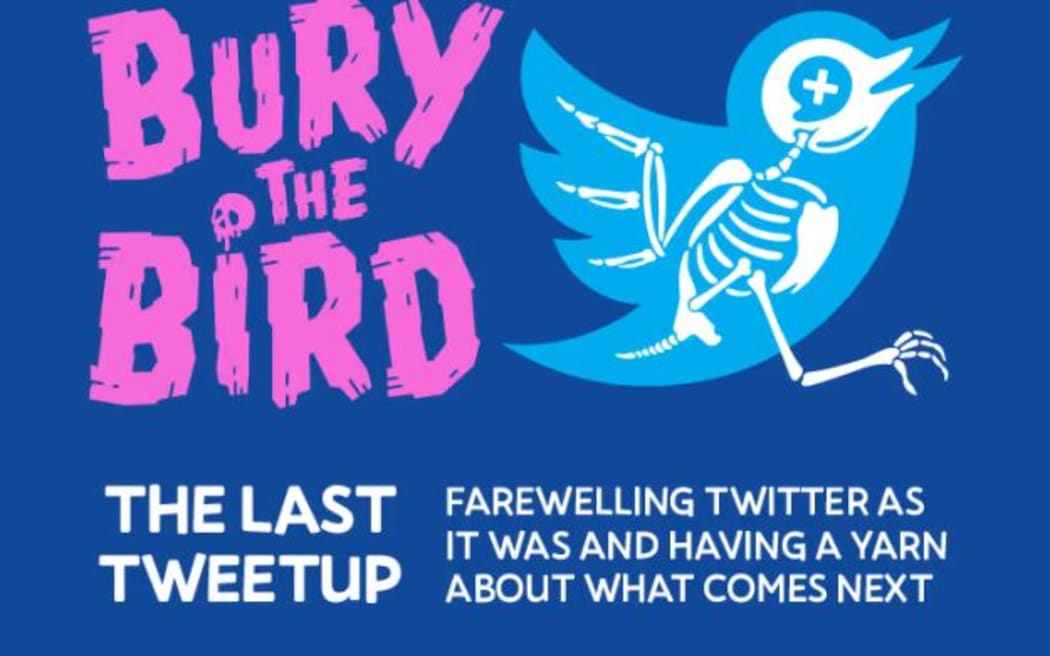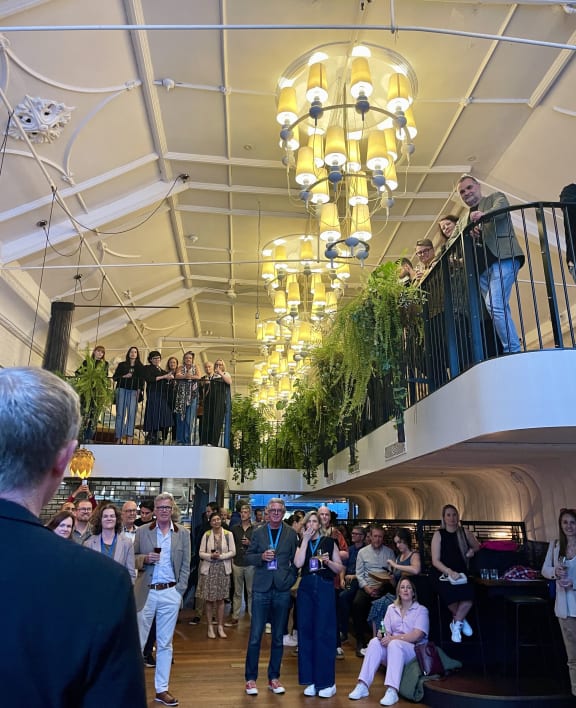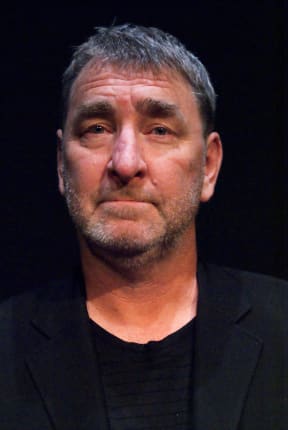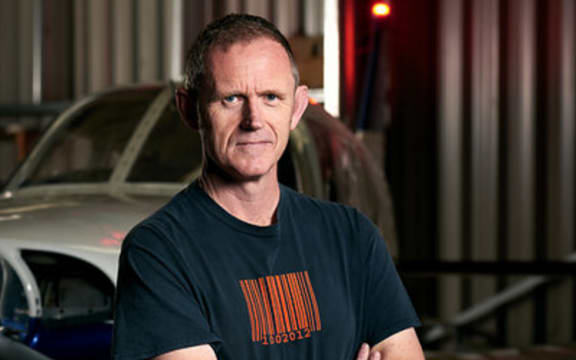Twitter emerged as an important source of live updates, news and images during the Arab Spring more than a decade ago. Many in the media also joined the platform to share news and commentary with users worldwide. But a year after Elon Musk took it over, X is a mess - and a group of local users recently gathered to 'Bury the Bird' for good.

Poster for the Bury the Bird gathering in Auckland discussing what went wrong with Twitter (now X) and what the future holds for social media' relationship with journalism. Photo: supplied
Last week the UK hosted a summit on the dangers of AI at Bletchley Park, the site of the celebrated Enigma code-breaking effort in World War II.
The British government said that they hoped the presence of the world's richest ever entrepreneur, Elon Musk, would "attract international attention".
It did. Musk's interview with the UK Prime Minister Rishi Sunak also made headlines when it was livestreamed on the social media platform that Musk owns - X, formerly Twitter.
"Having a referee is a good thing. And if you look at any sports game, there's always a referee. And nobody's suggesting to have a sports game without one," Musk told Sunak when asked how AI advances should be regulated.
"I think the right way to think about this is for governments to be a referee to make sure there's sportsmanlike conduct and public safety is addressed. We care about public safety," Musk told Sunak.
That would ring hollow for users of X who blame Musk for systematically dismantling 15 years' worth of moderation at Twitter in the past year since he bought it.
Two days later, Musk told podcaster Joe Rogan he bought Twitter to save it from an "extinctionist mind virus" - but it's Musk himself who seems to be speeding up Twitter's decline - and possible extinction.
Twitter was heavily used by the media because it became a powerful way of spreading and sharing news as well as commenting on it.
Its other unique selling point was 'micro-blogging' - making it possible to post short, sharp messages for followers of individual accounts and directly to some of the best-known and most powerful people and institutions in the world.
But Musk has driven a series of changes over the past year which slashed the platform's value by more than half while also destroying most of its value to its users, including the media and journalists.
Last week a bunch of media people in Auckland held an event called Bury The Bird - the bird being Twitter's distinctive logo until Musk replaced it with an ugly black 'X.' It was a kind of wake for the Twitter they had known, loved and used - including a debate hosted by BusinessDesk.

The crowd that gathered to Bury the Bird in Auckland. Photo: Anna Rawhiti-Connell
"We're taking the opportunity to celebrate what's been before and look forward to what comes next," said the organiser Vaughn Davis, the founder of marketing agency The Goat Farm, in a video post on X to lure people to the event.
"It's just an opportunity to say thanks, well done and farewell to a social media platform which I think gave a lot of us an awful lot over the last 15 years," he told followers.
Social media expert Anna Rawhiti-Connell, the head of audience at The Spinoff, was a panel guest at Bury the Bird.
"I first realised it was good for news during the Arab Spring because you were getting a range of different kinds of experiences that were maybe not being reported in the mainstream media - but came to be reported in the mainstream media," Rawhiti-Connell said.
"It was a tool where we could get citizen journalism. It's been a useful place for finding sources and finding stories - and Twitter leaned quite heavily on the culture of news and journalism in its foundational days," she told Mediawatch.
Pioneering blogger Russell Brown, a former Mediawatch host and current Listener columnist, was also a panelist at Bury the Bird.
"One of the great virtues of Twitter was that it was a live medium, whether just watching a live TV show or a significant event like the Indian Ocean tsunami (in 2004), the terrorist attacks in London (2005) and the earthquakes in Christchurch. It looked like this could be really valuable," Brown said.

Russell Brown Photo: supplied
"But flash forward to today and it's impossible to tell [on X] what is happening in Gaza. There is no possibility of trusting most of what you read, which is alarming. It's like the ultimate fog of war."
Locally, Stuff announced last month it had quit the platform altogether citing "mis- and disinformation being shared and the damaging behaviour exhibited on, and enabled by, the platform".
In the US, NPR took a similar move and the impact on its online engagement turned out to be minimal.
So is X now any use to journalists - or news organisations here?
"I think it still functions to a certain degree for plenty of journalists as a shortcut to events but it's diminished as a platform where you had a standing as a journalist," said Rawhiti-Connell.
"The main reason media might use a platform like Twitter now might be putting what you've written or created in front of an audience, and then getting them to go and look at it. That's probably massively diminished now."
"The irony for me is that Twitter built its brand to a certain extent on being a real-time current affairs and news platform. And yet . . . it's never been a place where people want to spend all their time," she said.
Brown said newsworthy things would still be said and done on Twitter.
"But there's certainly no sense that it's somewhere you have to be as a journalist. That said, I have particular specialist subject areas - like drug policy and urbanism - and there were networks of experts on Twitter that I don't know how to find anywhere else," he said.
"But then again, there's a very large side of Twitter that is utterly hostile to expertise. So, yeah . . . ."
The fact that media used Twitter heavily sparked claims it distorted journalists' view of what the wider world really cared about or held to be important.
"There was a period where it felt like there was a direct pipeline between Twitter and what would appear on the homepage. I think we always overcooked it slightly in terms of it being a reflection of what people in this country cared about," said Rawhiti-Connell.

Anna Rawhiti-Connell, head of audience at The Spinoff. Photo: Anna Rawhiti-Connell
Bury the Bird tried to pinpoint the problems responsible for the downfall of the platform's utility and credibility.
There's obviously Elon Musk, but also Donald Trump, the main character syndrome, the way that it has come to facilitate bullying and the impact of algorithms.
"Maybe no online social forum can last," Brown said. "I've been on the internet long enough to have been a Usenet user and I presided over some pretty lively forums on my own website Public Address. That was a really great place for a while but the moderation duties got too much - and then everything moved over to places where there was no moderation and no one's responsible. And it got worse."
Rawhiti-Connell said she had always been reluctant to indulge in too much moral panic and hysteria over social media platforms.
"But I also wonder whether we are equipped as a species . . . to ingest that much information in multiple different forms at all times. I wonder whether the breakdown of civility or behavioural standards is due to the fact that we're not actually meant to be doing that," said Rawhiti-Connell, who has already deleted her X account.
"Twitter specifically belongs to a particular era of social media networking.
"We're probably at a point where we may need to split how we talk about social media, because I think there's an argument something like TikTok is not social media but a form of entertainment and a content-creation platform. It's almost a broadcast platform more than a conversational one. I think that particular era of social media, networking is probably done."
Russell Brown is still active on X and has about 75,000 followers.
"That not down necessarily to my personal brilliance. Because I was there early and quite good at it I ended up being one of four accounts recommended to new users. There was a period when my follower count was going up by thousands a week.
"But I think (X) is now past the point where it can evolve. Things like retweets, things like hashtags were all created by its users - and the people running it responded to that. Musk has completely inverted that and now he's handing down these edicts that make it objectively worse. And I think that's where it's going to run into a wall."
What did Twitter do that other online services didn't - or couldn't?

Vaughn Davis runs Auckland advertising and social media company the Goat Farm Photo: Supplied
Vaughn Davis, the organiser of Bury the Bird and author of Tweet This Book., said many social media channels had been about following celebrities or connecting with people you used to know.
"Twitter gave us the opportunity to connect to people because of what they said, what they thought and who they really were. And that was pretty powerful.
"Limiting posts to 140 characters meant I don't have to record a video or some audio or write some big long essay, I've just got to come up with a little digital haiku. And the flip side of that it's sometimes challenging to encapsulate your thoughts and that drew people to it as well.
"It was always really important to remember Twitter was not the world. It wasn't even the online world. It was heavy on tech, it was heavy on media, it was heavy on politics. So if you're a politician, say, and that was your view of the world, it was a very skewed one. But if you were within those worlds and wanted to connect to other people... it was a great place to be.
"A lot of the great things about Twitter were made by the people who 'lived' there for their own benefit. And now changes and developments on the platform have been made by the owner for the benefit of the owner.
"I think the tide was going out on Twitter before Musk took it over. People have pointed towards Trump, Putin and Brexit as a time when Twitter became a space to polarise people.
"All digital media and social media channels have become a little less reliable than they once were. Consumers of the media now [need to] decide for themselves what is trustworthy and what is not, rather than leaving it to the editors.
"For me Bury the Bird was a bit like a good funeral, a celebration of the good things and the life of the departed as much as mourning for the death.
"I am sad... for the perhaps 5000 to 10,000 people in New Zealand who really deeply engaged with it. We made personal connections, we made business connections, we learned things, we got close to people we'd never otherwise get close to - and that time has passed.
"If you were a Beatles fan in 1965, you'd write them a letter and nothing would ever come back. But if you were a Neil Finn fan in 2015, you'd see him on Twitter and say: 'That lyric that really got me - so thanks.' And you could have a bit of a chat about it. That was really special" said Davis.
And it's easier to tweet at celebrities rather than have to chase The Beatles' limo, screaming and hoping the car will stop?
"Yes. If they remade A Hard Day's Night in 2023, I don't think it'd be quite as exciting."

